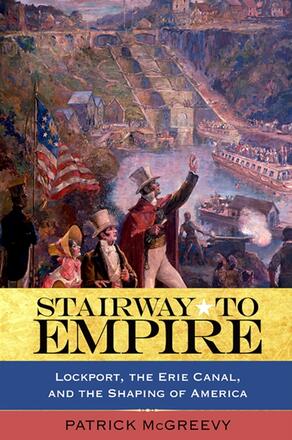
Stairway to Empire
Lockport, the Erie Canal, and the Shaping of America
The story of the Erie Canal’s completion and its place in the larger narrative of American modernity and progress.
Description
Winner of the 2009 Annual Archives Award for Excellence in Research Using the Holdings of the New York State Archives presented by the Board of Regents and the New State York Archives
The stunning achievement of the Erie Canal's completion is brought to life in this riveting story. In the spring of 1821, thousands of workers descended on the isolated village of Lockport, New York, twenty miles east of Niagara Falls. Their goal was to dig and blast a waterway through the so-called Mountain Ridge, the escarpment over which the Niagara River flows, and to divert some of that river's flow eastward, thus completing the Erie Canal. This final obstacle would take five years to overcome, and the Lockport Locks, the ingenious device that carried boats to the top of the ridge, would come to be seen as an icon of American achievement—like the Erie Canal itself, a stairway to empire.
Taking advantage of a rich trove of construction records, travelers' writings, and visual material, Stairway to Empire examines the triumphs and tensions of this iconic American accomplishment and its place in the larger narrative of American modernity and progress. In the decades that followed its completion, the canal rearranged political and economic power on the continent, forming new connections and rupturing old ones, and creating winners and losers in the process. Piercing the barrier of the Appalachian Mountains, the Erie Canal established New York City as the American metropolis, the North's economic ascendance over the South, and the United States as the dominant power in North America. Yet even as it explores these local and continental implications and the divergent meanings that have been attributed to them, Stairway to Empire also attends to the silences and shadows of a particular event (cutting through the Mountain Ridge), a particular place (Lockport), and the stories we have constructed to try to understand them.
Patrick McGreevy is Professor of History and Director of the Center for American Studies and Research at the American University of Beirut. He is the author of Imagining Niagara: The Meaning and Making of Niagara Falls.
Reviews
"Historians of technology will appreciate [McGreevy's] efforts to highlight the interconnectedness of environmental, social, and technological agents in Lockport's transition from a central node in America's nineteenth-century transportation infrastructure to a largely forgotten, postindustrial backwater. " — Technology and Culture
"Stairway to Empire offers a rare combination: a scholarly monograph with an autobiographical twist. In this labor of love, Patrick McGreevy … offers a richly textured biography of his hometown of Lockport, New York … It is deeply researched, interdisciplinary in nature, and written with sophistication and clarity. " — Journal of American History
"…McGreevy has produced a volume that not only details the story of the Erie Canal's completion but also considers its importance as a physical representation of American ideals, its significance as a tangible symbol of nineteenth-century national philosophy and its place in the larger narrative of American modernity and progress. " — The Canadian Geographer
"This is an assessment of a brief moment of nationwide prominence and the persisting realities of the meaning of change for not only Lockport, but for every community. " — CHOICE
"In this sagacious and thought-provoking study, McGreevy explores the multiple meanings of a once-renowned and significant American place experiencing the profound changes of industrialism and the onrushing market economy. " — Edward K. Muller, University of Pittsburgh